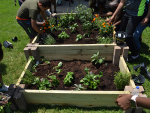Displaying items by tag: diet and nutrition
By focusing on key areas of health, one can enhance their quality of life and enjoy a vibrant, active life well into their golden years.
A cycle of physical and mental exhaustion has many contributors. A few tips to improve both can have immense positive effects in a person’s life.
Tagged under
Given the rising rates of obesity and diabetes, semaglutide could be used effectively to reduce the burden of these chronic diseases.
Tagged under
Keep football tailgates heart-healthy without sacrificing flavor with these tips from UAB cardiologists.
Tagged under
Five UAB experts provide advice on getting started, finding a group, staying motivated and coping with weather. Plus: how to run a successful walking meeting.
Tagged under
Ketones, ketogenic diet, ketosis — what does it all mean? UAB expert Eric Plaisance, Ph.D., explains the ketogenic diet and the known health benefits it produces.
Students in third, fourth and fifth grades can attend the Happy Healthy Hard Elementary Summer Camp now through July 9.
Tagged under
Running a marathon can be rewarding. Training for a marathon can be hard work. Here is how to do it right.
Tagged under
Tagged under
Study suggests that weight loss, even if associated with intermittent weight gain, is worthwhile in that there appears to be no harm and possible benefit in terms of cardiovascular outcomes.
Tagged under
Smart fitness devices like watches or apps may help some people lose weight; but before you buy, make sure you understand how it works and if you are the right candidate for this technology.
Tagged under
“Diet and exercise are likely going to be the most helpful for losing the weight, but it is the weight loss itself that spares the knee joints.”
Tagged under
After experiencing side effects from his obesity on a meaningful vacation, one man seeks medical attention from UAB on his weight loss journey.
Amy Goss, Ph.D., R.D.
Nutrition • Obesity • Metabolism • Diabetes prevention and treatment • Ketogenic diet
Tagged under
Tagged under
Ketogenic, Whole30 and paleo diets aren’t convenience diets — they can cause challenges for eating out and cause a strain on your wallet — but they do provide whole food solutions.
Tagged under
A collaboration between Birmingham AIDS Outreach and the UAB 1917 Clinic looks to provide nutrition support and education to address and prevent the rise of chronic disease in patients living with HIV.
Tagged under
The UAB Geriatrics Clinic is addressing health issues in senior adults by identifying and addressing gaps in nutrition.
Tagged under



















